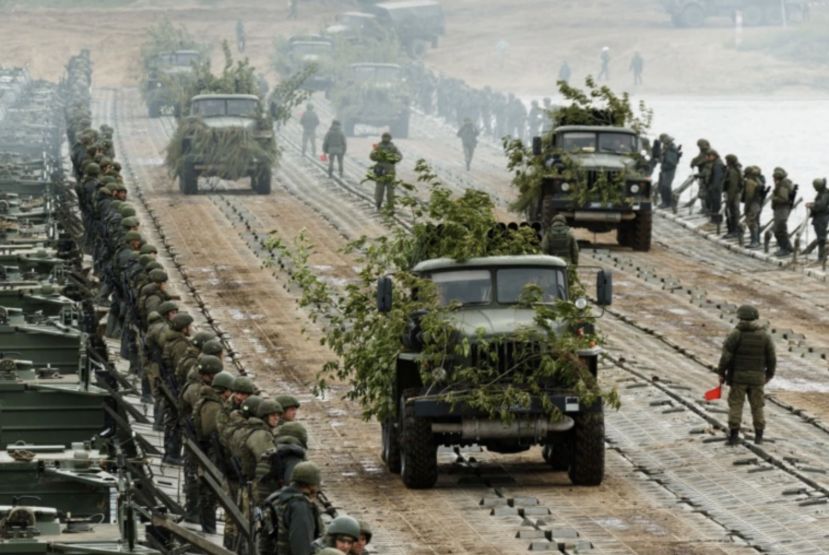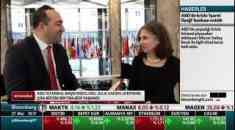U.S. Warns NATO Allies of Possible Russian Invasion in Ukraine
There is a major Ukraine alert at the capital, Washington, DC. Russia's long-standing amassing of military forces near the Ukraine borders, in addition to Putin's steps to send some of the navy ships to the Black Sea, have increased the USA's concerns about the possibility of Russia invading a large portion of Ukraine. Yes, you didn't hear it wrong: a considerable part, including Odessa. So what is the U.S. doing about this? We found out that European countries within NATO, while warning allies such as Turkey that there is a small-time window to prevent military intervention in Ukraine, are also urging them to work closely with the U.S. in order to develop a package of economic and military measures to dissuade Moscow. American officials believe that It is unclear what Russia is planning to do with the military buildup near Ukraine. However, the buildup is taken seriously, and the U.S. does not assume that it is a bluff, meaning that the Biden administration is growing more convinced that Russian President Vladimir Putin is considering military action either to seize a more significant portion of Ukraine or to create enough instability to form a more Pro-Moscow government.
Last month,while the U.S. Secretary of Defense Lloyd Austin had a meeting with his Ukrainian counterpart Oleksii Reznikov, the U.S. chairman of the Joint Chiefs of Staff Mark Milley spoke with his Ukrainian counterpart Valery Zaluzhny about the military mobilization on the Ukrainian border and the possibilities. At the same time, it is good to recall that Avril D. Haines, the Director of National Intelligence, had traveled to Brussels last month in order to brief the NATO ambassadors about the American intelligence and possible Russian military intervention in Ukraine. Recently, Secretary of State Antony Blinken and his Russian counterpart Lavrov met in Stockholm to discuss the tension in the region. There will be video call next week between Russian President Vladimir Putin and U.S. counterpart Joe Biden, amid tensions over the conflict in Ukraine.
On the US-Turkey side, the statements suggesting that Ukraine was also discussed during the phone call that the National Security Advisor Jake Sullivan had with President's Spokesperson Ibrahim Kalin are noteworthy.Turkey is ready to act as a mediator between Ukraine and Russia but Russia already declined Turkey's proposal. We have seen NATO Secretary-General Jens Stoltenberg offer his own statements on Russia. Stoltenberg commented on the "large and unusual" concentration of Russian forces on Ukraine's border. "It is urgent that Russia shows transparency about its military buildup, de-escalate and reduce tensions," he stated.
Probabilities in Europe
With Chancellor Angela Merkel of Germany leaving the world stage, there is less pressure on Ukraine to make concessions. Without a coalition in Germany, there is not much leadership in Berlin. Rising energy prices have made Europe more dependent on cheap Russian gas supplies, especially as winter becomes more challenging and gas reserves in Europe drop further. Fear of losing access to Russian energy could limit Europe's support of tough sanctions. The U.S. wants to create a "common prescription" of actions they would abide by together with Europe, should Russia move against Ukraine with its military. While there are parts of Russia's economy that have not been subjected to sanctions, the United States will need to build support in Europe for new measures to be effective. We can say that there are experts stating that another factor must be taken into account: the West may not be able to take significant steps in new military operations since Russian President Putin knows that during the Obama-Biden Administration, the U.S. and Europe were inadequate during the annexation of Crimea. At the same time, officials say that the NATO countries need to be mindful that the Belarusian crisis and troop buildup on Ukraine's border are occurring at the same time.
Townsend, a former senior Pentagon official who is well-known to Turkey, said, "We have to be ready to be tough. Putin acts quickly.I think he likes distracting and stalling off. He has the chance to play a game. All eyes are on the Belarusian border.Meanwhile, he is putting together what he thinks might be required when going to Ukraine. We don't have to bomb anything. But we have to be clever in how we show our military capacity."
Michael McCaul, former U.S. Ambassador to Russia, said, "To respond to Russia's provocative measures on Ukraine's borders, yes, Biden should talk to Putin and at the same time send more anti-tank Javelin missiles and get the Turks to send more armed drones to Ukraine. Ukrainians must be allowed to defend themselves."
What Will Turkey Do?
No matter how tense Turkish-American relations are, the possible developments regarding Ukraine may require the two NATO allies to work closely. We know that Turkey openly condemned Russia for the annexation of Crimea. I assume that we will enter a period in which dialogues between American and Turkish military officials will increase. We can state that for more than a year in Washington, DC, there have been both official and civil security experts making statements on Turkey's power over the Black Sea, and the U.S. should work more closely with Turkey. I can say that I expect Turkey to comply with all the decisions made by NATO in order to avoid conflict in case of Russian military action. The question in DC is what NATO and neighboring NATO countries can possibly do about Putin's actions towards dividing Ukraine from multiple sides, whether from the land or the Black Sea.
I hope that mistakes were learned from the Russian annexation of Crimea in 2014. Ukraine's membership in NATO should be considered as soon as possible. If Ukraine were a NATO member, Russian would not dare plan to invade Ukraine, or we would not be talking about this unexpected development now. Let's not wait to see Russia illegally capture more land from Ukraine or other Eastern European countries.
It's time that all NATO members unite stronger than ever.
Related items
Latest from Ali Cinar
- Merve Hickok, President of the Center for AI and Digital Policy, speaks on the latest developments in AI.
- Bloomberg HT U.S. Representative Ali Cinar interviews Julie Ediah, U.S. Consul General of Istanbul
- Integrated Polymer Industries Recognized by Northrop Grumman for Supplier Excellence
- Cuts to Social Work and Education Budgets in New York
- President Biden meets with Texas governor, officials in 1st visit to US-Mexico border










